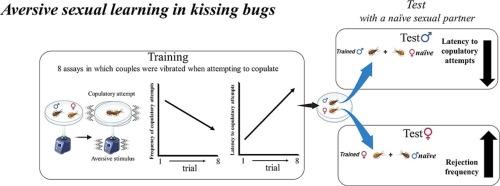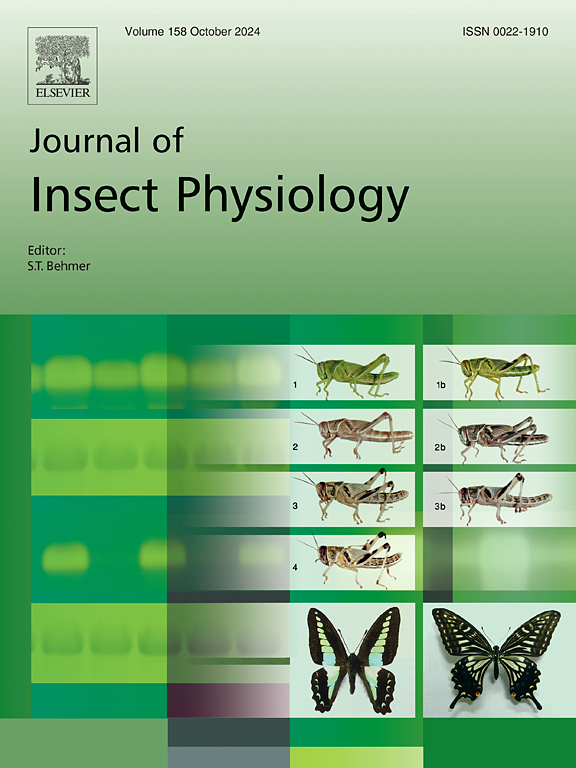Aversive sexual learning in the kissing bug Rhodnius prolixus: Modulation of different sexual responses in males and females
IF 2.3
2区 农林科学
Q1 ENTOMOLOGY
引用次数: 0
Abstract
Although sexual learning can be a key process in the reproductive success of animals, research focused on the experience-dependent modulation of courtship in insects is scarce. In kissing bugs, the behavioural steps implicated in mating have been exhaustively studied, but not the involvement of learning in them. Our objective was to determine whether the sexual behaviour of Rhodnius prolixus could be modulated by experience. During training, couples were submitted to eight assays, in which they received a vibration (negative reinforcement) when the male attempted to copulate the female. Immediately after, they were separated, not allowing the occurrence of copulation. We found that along training, males’ latency to perform a copulatory attempt increased, male’s copulatory attempts were less frequent, and females’ locomotor activity did not change. These results suggest that males, and not females, learned to avoid the vibration by reducing their intention to copulate. In post-training tests, conditioned males presented with new naïve females reverted to low copulatory attempt latencies, suggesting that the modulation was partner-specific. Besides, conditioned females increased their rejection frequencies to males’ copulatory attempts, suggesting that a second type of learning occurred in females. These results constitute the first evidence of sexual learning in hematophagous insects. Males and females seem to change their selectivity according to their previous sexual experience. We discuss the relevance that this plasticity might have in the fitness of this epidemiologically relevant insect.

亲吻蝽的厌恶性学习:对雄性和雌性不同性反应的调节
尽管性学习可能是动物繁殖成功的一个关键过程,但有关昆虫求偶行为的经验依赖性调节的研究却很少。在接吻虫中,交配过程中的行为步骤已经得到了详尽的研究,但学习在其中的作用却没有得到研究。我们的目的是确定亲吻蝇的性行为是否会受到经验的调节。在训练过程中,雄性和雌性共进行了八次试验,当雄性试图与雌性交配时,它们会受到振动(负强化)。紧接着,它们被分开,不允许发生交配。我们发现,在训练过程中,雄性尝试交配的延迟时间增加,雄性尝试交配的频率降低,而雌性的运动活动没有变化。这些结果表明,雄性(而非雌性)通过降低交配意图学会了躲避振动。在训练后的测试中,条件雄性与新的天真雌性交配后,交配尝试的潜伏期恢复到较低水平,这表明这种调节是针对特定伴侣的。此外,受条件控制的雌性增加了对雄性交配尝试的拒绝频率,这表明雌性进行了第二种学习。这些结果首次证明了食血昆虫的性学习。雄性和雌性似乎会根据以前的性经验改变它们的选择性。我们讨论了这种可塑性对这种流行病学相关昆虫的适应性可能产生的影响。
本文章由计算机程序翻译,如有差异,请以英文原文为准。
求助全文
约1分钟内获得全文
求助全文
来源期刊

Journal of insect physiology
生物-昆虫学
CiteScore
4.50
自引率
4.50%
发文量
77
审稿时长
57 days
期刊介绍:
All aspects of insect physiology are published in this journal which will also accept papers on the physiology of other arthropods, if the referees consider the work to be of general interest. The coverage includes endocrinology (in relation to moulting, reproduction and metabolism), pheromones, neurobiology (cellular, integrative and developmental), physiological pharmacology, nutrition (food selection, digestion and absorption), homeostasis, excretion, reproduction and behaviour. Papers covering functional genomics and molecular approaches to physiological problems will also be included. Communications on structure and applied entomology can be published if the subject matter has an explicit bearing on the physiology of arthropods. Review articles and novel method papers are also welcomed.
 求助内容:
求助内容: 应助结果提醒方式:
应助结果提醒方式:


